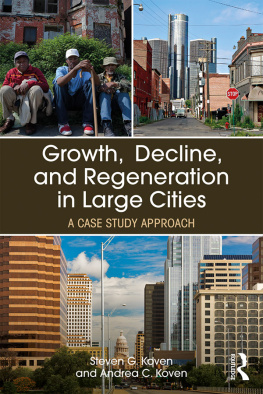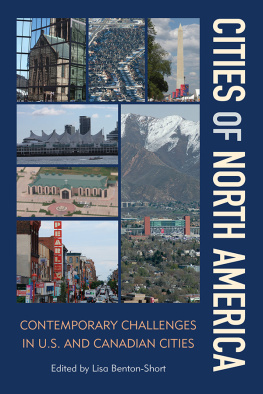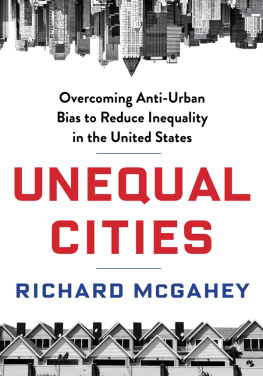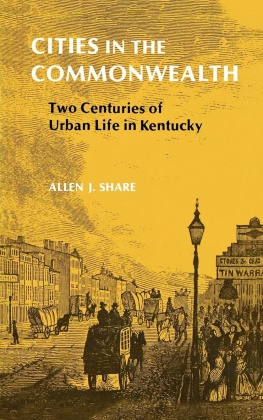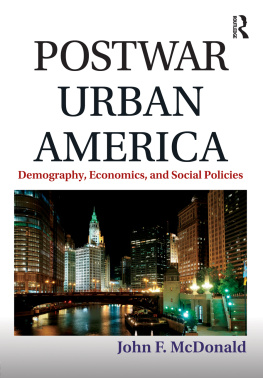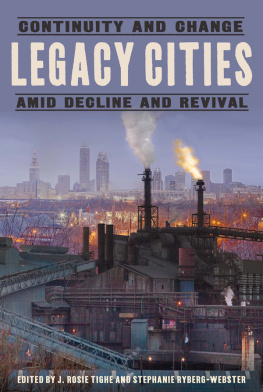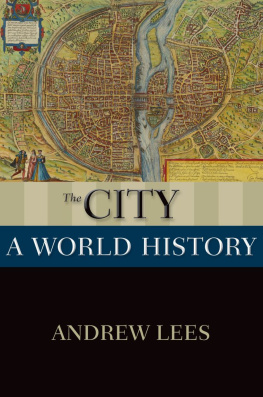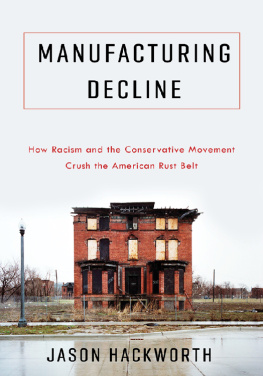Koven and Koven provide a uniquely comprehensive perspective on economic development in cities. Going beyond the traditional theories of economic development, they bring to bear the many forces, internal and external, that play a role in the growth, decline, and revitalization of U.S. urban areas, effectively demonstrating these in action through the engaging explication of four well-chosen case studies.
Thomas S. Lyons, Professor and Director, Product Center Food-Ag-Bio, Michigan State University
An excellent compendium of the broad array of theories of urban growth and economic development frames in-depth examinations of four selected casestheir development trajectories, population characteristics, leadership, and cultureto analyze place-based manifestations of globalization and economic restructuring and the role of public policy.
Cynthia Negrey, Professor, Sociology, University of Louisville
The Kovens enlightening case studies of development, decline, and resurgence in four United States cities present major insights into the roles of local culture, entrepreneurship, and flexibility in adapting to the changing economic, demographic, and political challenges posed by the creative destruction of capitalism in the era of globalization.
Mack Shelley, University Professor and Chair, Political Science, Iowa State University
The Kovens have produced a brilliant book on urban decline and regeneration with insights about the dynamics of how and why of modern day cities. The writing is sharp and clear in providing lessons for city leaders on making cities prosperous and equitable for all. A pleasure to read that goes against conventional wisdom.
John Hans Gilderbloom, Director, Center for Sustainable Urban Neighborhoods, University of Louisville
The book highlights the economic development challenge facing large cities and what they can actually do about it. Clear and well-written, it is one of the few examples of university scholarship that has immediate utility for economic development officials in state and local government. The case study format also lends itself to giving students the tools to undertake their own analysis and flip the classroom.
Ronald K. Vogel, Professor, Politics and Public Administration, Ryerson University
Growth, Decline, and Regeneration in Large Cities
Growth, Decline, and Regeneration in Large Cities sheds light on why some cities prosper, others implode, and still others are able to reverse their downward trajectories. The book focuses on four major case studies of American metropolitan areas: Detroit, Boston, Minneapolis, and Austin. It explores how distinctive political and cultural forces in these cities affected economic growth or decline. Theoretical frameworks to explain economic development in urban areas are identified. The book addresses important subjects such as response to deindustrialization, disruption caused by gentrification, globalization, and the importance of human capital for economic development.
Steven G. Koven is Professor in the Department of Urban & Public Affairs at the University of Louisville.
Andrea C. Koven is Visiting Lecturer in the Department of Sociology at the University of Louisville.
The Metropolis and Modern Life
A Routledge Series
Edited by Anthony Orum, Loyola University Chicago, and Zachary P. Neal, Michigan State University
This series brings original perspectives on key topics in urban research to todays students through short accessible texts, guided readers, and practical handbooks. Each volume examines how long-standing urban phenomena continue to be relevant in an increasingly urban and global world and, in doing so, connects the best new scholarship with the wider concerns of students seeking to understand life in the twenty-first century metropolis.
Books in the Series:
Growth, Decline, and Regeneration in Large Cities: A Case Study Approach by Steven G. Koven and Andrea C. Koven
Common Ground? Reading and Reflections on Public Space edited by Anthony Orum and Zachary P. Neal
The Gentrification Debates edited by Japonica Brown-Saracino
The Power of Urban Ethnic Places: Cultural Heritage and Community Life by Jan Lin
Urban Tourism and Urban Change: Cities in a Global Economy by Costas Spirou
The Connected City by Zachary Neal
The Worlds Cities edited by A.J. Jacobs
Ethnography and the City edited by Richard Ocejo
Forthcoming
Comparative Urban Studies by Hilary Silver
Housing America: Issues and Debates by Emily Tumpson Molina
First published 2018
by Routledge
711 Third Avenue, New York, NY 10017
and by Routledge
2 Park Square, Milton Park, Abingdon, Oxon, OX14 4RN
Routledge is an imprint of the Taylor & Francis Group, an informa business
2018 Taylor & Francis
The right of Steven G. Koven and Andrea C. Koven to be identified as authors of this work has been asserted by them in accordance with sections 77 and 78 of the Copyright, Designs and Patents Act 1988.
All rights reserved. No part of this book may be reprinted or reproduced or utilised in any form or by any electronic, mechanical, or other means, now known or hereafter invented, including photocopying and recording, or in any information storage or retrieval system, without permission in writing from the publishers.
Trademark notice: Product or corporate names may be trademarks or registered trademarks, and are used only for identification and explanation without intent to infringe.
Library of Congress Cataloging-in-Publication Data
A catalog record for this book has been requested
ISBN: 978-1-138-70380-3 (hbk)
ISBN: 978-1-138-70381-0 (pbk)
ISBN: 978-1-315-20216-7 (ebk)
Typeset in Adobe Caslon Pro
by Apex CoVantage, LLC
As representatives of their constituents, elected leaders have a responsibility to provide for the general welfare of residents. General welfare includes economic well-being as well as provision of basic services. In todays global economy, leaders must forge strategies to compete globally, nationally, and locally. Leaders strive to create jobs, retain businesses, and attract enterprises. The overall ecology of place affects the success or failure of these efforts. Today, business leaders can choose where they locate and in the process extract enormous subsidies from jurisdictions. Often, economically depressed areas cannot compete because of a host of negative externalities associated with their polity. The economic winners grow wealthier; the losers struggle to survive.
Detroit, Austin, Boston, and Minneapolis are exemplars of economic implosion, massive new wealth, and revitalization. This book highlights the experiences of these cities in order to illustrate the unevenness of development and describe chances for regeneration. The experiences of Boston and Minneapolis suggest that declining cities should not feel they are doomed to abandoning all hope. The data indicate that Boston and Minneapolis successfully navigated through the minefields of job losses in major enterprises to emerge with modern economic bases that sent them on a path toward continued economic prosperity. Boston and Minneapolis represent examples of economic regeneration and a reminder that throughout time, some places have always discovered a way to prosper. The two cities regenerated as new sources of revenue replaced the old.

